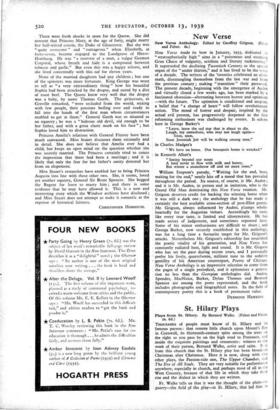New Verse
New Verse made its bow in January, 1933, dedicated to " stratospherically high " aims in a " poisonous and steaming
Gran Chaco of vulgarity, sciolism and literary racketeering."
It superseded the declining Twentieth Century as the special organ of the " under thirties," and it has lived to be the voice of a decade. The writers of the 'twenties celebrated an after-
math, disentangling themselves from the last war and from the previous century ; making " transition " their password.
The present decade, beginning with the emergence of Auden and virtually closed a few weeks ago, has been marked by a fascinated obsession—alternating between horror and optimism —with the future. The optimism is conditional and utopian, a belief that " a change of heart " will follow revolutionary action. The mood of horror and despair, inspired by the actual evil present, has progressively deepened as the first reforming enthusiasm was challenged by events. It echoes here in George Barker's •
"Leave, leave the sad star that is about to die.
Laugh, my comedians, who may not laugh again— Soon, soon, Soon Jeremiah Job will be walking among men."
in Charles Madges's " We have no home. Our bourgeois home is wrecked." in Kenneth Allott's " Seeing beyond our noses A land never to flow with milk and honey, But winter a stonethrow off and no more roses."
William Empson's parody, " Waiting for the end, boys,
waiting for the end," neatly hits off a mood that has prevailed throughout the period. Its source, of course, is Mr. Auden ; and it is Mr. Auden, in person and in imitation, who is the Grand Old Man dominating this New Verse reunion. Mr. Grigson deserves credit for backing the winning horse when it was still a dark one ; the anthology that he has made is
certainly the best available cross-section of post-Eliot poetry. Mr. Grigson, always influenced by Auden, plumps whole- heartedly for the Augustan virtues. Accordingly his taste, like every true taste, is limited and idiosyncratic. He has made errors of judgement, and sometimes repented later. Some of his minor enthusiasms are difficult to share ; and George Barker, now securely established in this anthology, was for a long time a favourite target for Mr. Grigson's
attacks. Nevertheless Mr. Grigson's editorship has nourished the poetic vitality of his generation, and New Verse has constantly radiated heat, light and sound. It is Mr. Grigson who has set the pace during recent years, and I personally prefer his lively, quarrelsome, militant tone to the sedative gentility of his American counterpart, Poetry of Chicago. New Verse Anthology is an impressive selection to come from the pages of a single periodical, and it epitomises a genera- tion no less than the Georgian anthologies did. Auden, Spender, MacNeice, Barker, Dylan Thomas and Bernard Spencer are among the poets represented, and the book includes photographs and biographical notes. In the field of contemporary poetry this is a book of permanent value.
DESMOND HAWKINS.










































 Previous page
Previous page